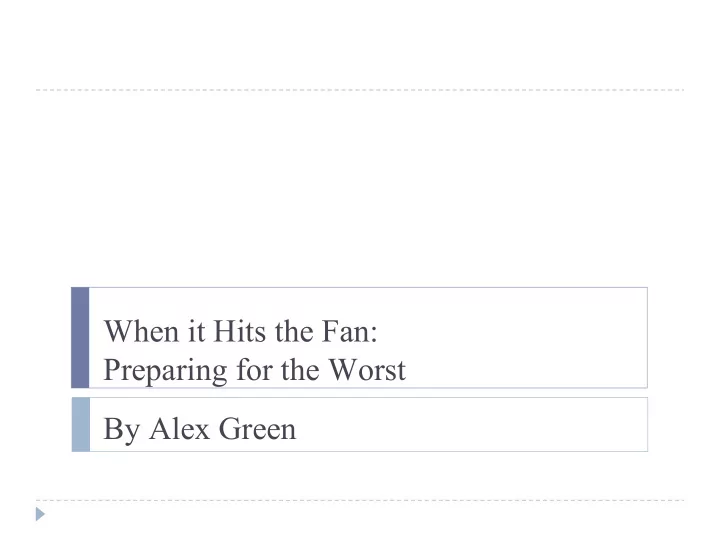

When it Hits the Fan: Preparing for the Worst By Alex Green
Overview What is a Crisis Crisis Mgmt Framework Consider the Crisis Reactive or Proactive? Plan the Six P’s Putting it Together Group Exercise Crisis Mgmt Complications Q&A
What is a Crisis? Threatens personal, physical, mental, structural, or fnancial wellbeing of your cooperative Confronting them is diffcult Labor-intensive Expensive Lifestyle-damaging How can we prepare ourselves?
Crisis Management Framework
Consider the Crisis Brainstorming a Crisis Walkthrough to anticipate issues Imagine the crisis occurring How is it caused? What happens? Who is affected and how? Does it affect some people different than others? How does it change their lives? What is the result? Helps to plan preparation
Consider the Crisis: Crises Types I Maintenance/Structural Financial Fire Theft Flooding and leaks Entity: organization, house, personal Electrical Method: taking/spending Structural collapse money, credit card fraud Run out of cash Carbon monoxide Animal/insect infestation Operational High vacancies Member non-payment Breakdown in governance
Consider the Crisis: Crisis Types II Personal/Interpersonal Personnel Physical: assault, injury, Leadership resignation death Staff leaving Mental-health-related Staff fred Breakdown, suicide, Personnel/Admin Confict substance abuse, self-harm Fighting: physical/non- External Personal Ideological confict Drug-related: selling, using Violence Stalking Rowdy party Assault
Proactive or Reactive: Two Types of Crisis Management (I) Are we planning a Proactive or Reactive Response? Proactive – Something might happen! Let’s prepare. ID surfacing risks and “right the course” “What can we do to keep this from getting bad?” Take steps to prevent or minimize crises before they happen Reactive – Something happened! What do we do? Equip decision-makers to act quickly Information, guidelines, and clear delineation of authority Provide guidance for making good choices
Proactive or Reactive: Two Types of Crisis Management (II) Proactive – Something might happen! Let’s prepare. Less urgent Less expensive More “what we wanted, how we wanted it” Reactive – Something happened! What do we do? More urgent More expensive More compromises/less convenient Hope Proactive action works, but need to prepare both!
Plan the Six P’s
Plan the 6 P’s Guidelines for considering components of a Response Preparation How should we get ready to respond? People Who will be mobilized? Process What procedures to follow? Policy What rules to adopt? Payment What are the costs? Post-Care* How do we provide closure? Good Responses often consider most or all P’s
Putting it Together: Scenario I A House Treasurer could steal/spend House money Walkthrough: The house has relaxed oversight of fnances House Treasurer steals and/or spends house money Treasurer hides evidence and/or destroys records Proactive or Reactive? Proactive: Create system of independent fnancial reviews Reactive: Call police, expulsion hearing, legal action/settlement
Putting it Together: Scenario I Proactive: Create system of independent fnancial reviews The Six P’s - Proactive Prepare: House leaders draft & vet a system to be presented at a house meeting People: House leadership, entire house, staff, org leadership Process: Systems of house governance, approach to the fnancial reviews Policy: New house/organizational rules to enact review system Payment: N/A Post-care*: A house conversation about seeing their house mates as adversaries
Putting it Together: Scenario I Reactive: Call police, have an expulsion hearing, pursue legal action and/or a settlement The Six P’s - Reactive Prepare: Clear authority granted to those who have to respond People: House leadership, entire house, staff, org leadership Process: The house’s expulsion procedure Policy: N/A Payment: Potentially a lawyer and/or collections agency Post-care*: A speak & share meeting may be needed to provide house members with closure
Putting it Together: Group Exercise Choose a crisis from the Appendix (or your own) Apply the framework Crisis Walkthrough Proactive or Reactive? The Six P’s Refect, acknowledge, and suggest R: What was the experience like? A: What went well? Where did we struggle?
Crisis Mgmt: The “Can” Complications Sometimes Crisis Management can seem to… Require too many people Be prohibitively expensive Be emotionally exhausting Never end! But it can also be… Reasonable and Flexible
Questions & Discussion
Recommend
More recommend